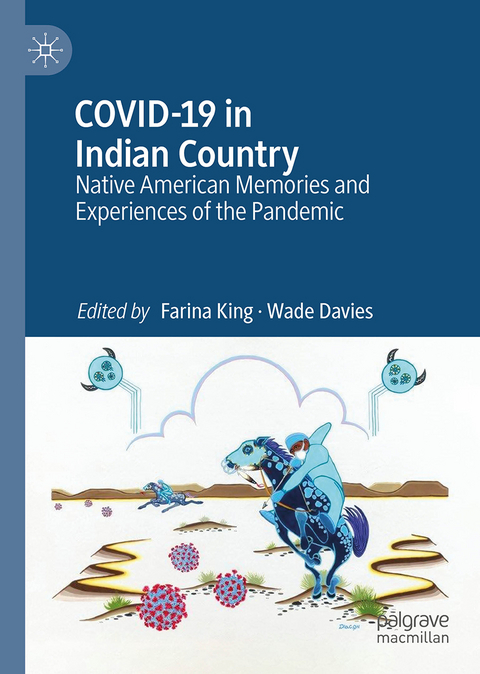
COVID-19 in Indian Country
Springer International Publishing (Verlag)
978-3-031-70183-2 (ISBN)
- Noch nicht erschienen - erscheint am 26.12.2024
- Versandkostenfrei
- Auch auf Rechnung
- Artikel merken
As the COVID-19 pandemic struck peoples throughout the world, it disproportionately devastated Native American communities. The inequalities, disparities, and injustices they had long experienced as historically marginalized peoples magnified the effects of this crisis throughout Indian Country, causing high hospitalization and death rates, as well as intense economic and social dislocation. This edited volume seeks to tell stories of Native Americans facing this matrix of disease and colonialism in these pandemic years while also highlighting ways that Indigenous people innovated, bonded, and endured through this crisis. It features Indigenous perspectives and experiences through scholarly and creative pieces including short stories, visual art, and academic and personal narratives. Contributors ask how past experiences and traumas have contextualized Native people's responses to COVID-19 and how intergenerational knowledge and ties have sustained their communities during the pandemic.
Farina King is an Associate Professor of Native American Studies and Horizon Chair of American Ecology and Culture at the University of Oklahoma, USA. Her books include The Earth Memory Compass: Diné Landscapes and Education in the Twentieth Century (2018) and Diné dóó Gáamalii: Navajo Latter-day Saint Experiences in the Twentieth Century (2023).
Wade Davies is a Professor of History at the University of Montana, USA. His books include Healing Ways: Navajo Health Care in the Twentieth Century (2001) and Native Hoops: The Rise of American Indian Basketball, 1895-1970 (2020).
Introduction.- Part I: Historical Inequities and Institutions.- Chapter 1: "'The Tribal Decline': Fort Hall Reservation and the Influenza Pandemic 1918 to 1920," by Yvette Towersap.- Chapter 2: "Indigenous Communities under the COVID-19 Pandemic: How to Fight the "Invisible" Violence," by Kumoko Noguchi.- Chapter 3: "The Intersection of the Law and Health: Water (In)security in Indian Country," by Heather Tanana.- Part II: Student Experiences and Education.- Chapter 4: "Lived Experiences of Native American College Students during the COVID-19 Pandemic," by Amoneeta Beckstein.- Chapter 5: "Navigating the unknown: Lessons learned from sustaining Indigenous community higher education during the COVID-19 Pandemic," by Daniel Piper, Melissa Tehee, Erica Ficklin, and Rachael Killgore.- Chapter 6: "A Vigil" by Farina King and Phillip Lee Smith.- Part III: Grassroots and Community Responses.- Chapter 7: "A 21st Century Pandemic in Indian Country: The Resilience of the Muscogee (Creek) Nation Against Covid-19," by Midge Dellinger.- Chapter 8: "'The Box': More than a Receptacle for Newspapers, A Witness to COVID's Impact at a Tribal College," by Christine Ami.- Chapter 9: "The Rise of Non-Profit Action in the Face of Tribal Governing Non-Action: The Limits of Navajo Institutions in the Covid-19 Crisis," by Wendy Greyeyes.- Part IV: Art and Language as Survivance.- Chapter 10: "Native American Memories and Experiences of the Pandemic," by Gavin Healey.- Chapter 11: "Maawanji'idiwag: They Come Together," by Chelsea Mead.- Part V: Motherhood, Aunties, and Families.- Chapter 12: "Aunties of Resilience: Decolonization during Covid-19," by Jennifer Frazee.- Chapter 13: "A Navajo Mother Fights for Her Child during COVID-19: a personal narrative," by Shaina A. Nez.- Chapter 14: "American Indian Women Combating COVID-19, the House Disruptor," by Mary Jo Tippeconic Fox and Aresta Tsosie-Paddock.- Chapter 15: "Indigenous Motherhood Resiliency: Adapting Cultural Teachings During COVID-19 Restrictions," by Natahnee Nuay Winder.- Conclusion.
| Erscheint lt. Verlag | 26.12.2024 |
|---|---|
| Zusatzinfo | Approx. 305 p. |
| Verlagsort | Cham |
| Sprache | englisch |
| Maße | 148 x 210 mm |
| Themenwelt | Geisteswissenschaften ► Geschichte ► Regional- / Ländergeschichte |
| Geschichte ► Teilgebiete der Geschichte ► Kulturgeschichte | |
| Schlagworte | 1918 Influenza pandemic • cherokee nation • Indigenous history • Pawnee • Shoshone-Chippewa-Cree |
| ISBN-10 | 3-031-70183-6 / 3031701836 |
| ISBN-13 | 978-3-031-70183-2 / 9783031701832 |
| Zustand | Neuware |
| Haben Sie eine Frage zum Produkt? |
aus dem Bereich


